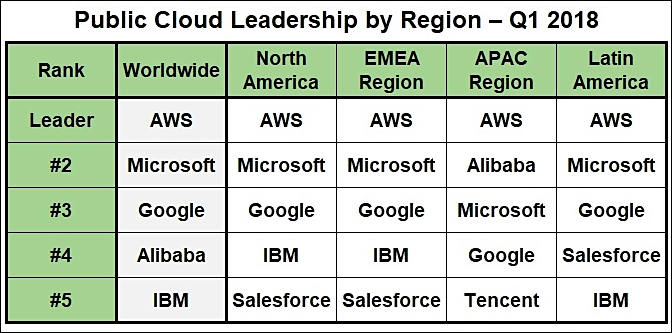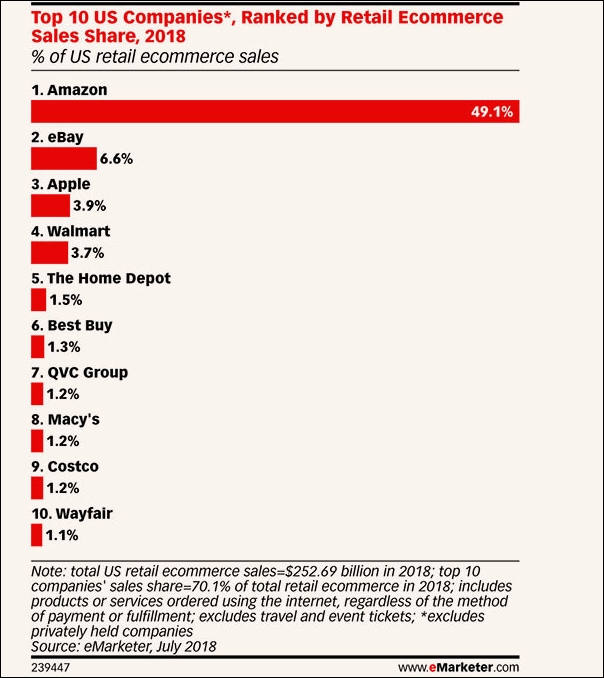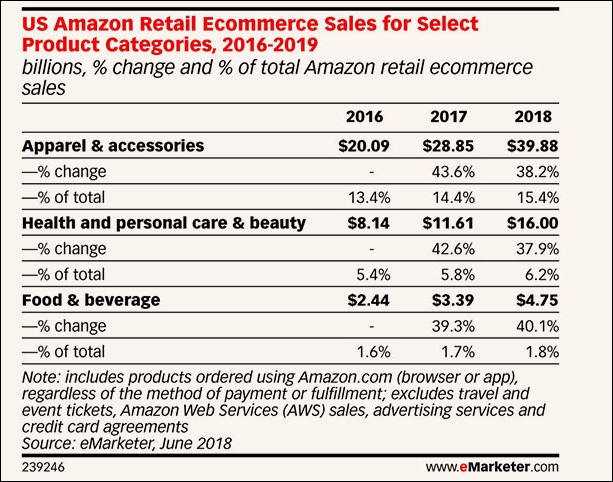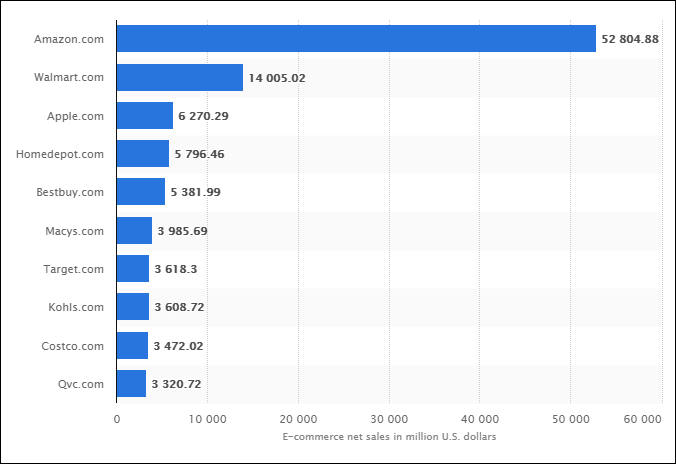
-
Amazon.com Inc met in Brazil last week with an array of manufacturers to discuss plans to stock and sell products from consumer electronics to perfume in the country, according to two people that took part in the meetings.
Amazon is looking to lease a large warehouse just outside of Sao Paulo.
E-commerce accounts for around 5 percent of Brazil’s roughly $300 billion retail market — about half its share in the United States — but has doubled in the past four years and is forecast to keep growing annually at a double-digit pace.
-
On free business and invisible market hand
While we are on the subject, it is reported that the U.S. Post Office will lose $1.50 on average for each package it delivers for Amazon. That amounts to Billions of Dollars. The Failing N.Y. Times reports that “the size of the company’s lobbying staff has ballooned,” and that...
I have stated my concerns with Amazon long before the Election. Unlike others, they pay little or no taxes to state & local governments, use our Postal System as their Delivery Boy (causing tremendous loss to the U.S.), and are putting many thousands of retailers out of business!
Now as Trump is after them we can be calm.
-
3 years post-launch, we have exceeded 100 million paid Prime members globally. In 2017 Amazon shipped more than five billion items with Prime worldwide, and more new members joined Prime than in any previous year – both worldwide and in the U.S. Members in the U.S. now receive unlimited free two-day shipping on over 100 million different items. We expanded Prime to Mexico, Singapore, the Netherlands, and Luxembourg, and introduced Business Prime Shipping in the U.S. and Germany. We keep making Prime shipping faster as well, with Prime Free Same-Day and Prime Free One-Day delivery now in more than 8,000 cities and towns. Prime Now is available in more than 50 cities worldwide across nine countries. Prime Day 2017 was our biggest global shopping event ever (until surpassed by Cyber Monday), with more new Prime members joining Prime than any other day in our history.
Amazon.in is the fastest growing marketplace in India, and the most visited site on both desktop and mobile, according to comScore and SimilarWeb. The Amazon.in mobile shopping app was also the most downloaded shopping app in India in 2017, according to App Annie. Prime added more members in India in its first year than any previous geography in Amazon’s history. Prime selection in India now includes more than 40 million local products from third-party sellers, and Prime Video is investing in India original video content in a big way, including two recent premiers and over a dozen new shows in production.
https://www.sec.gov/Archives/edgar/data/1018724/000119312518121161/d456916dex991.htm
-
Amazon says its median employee pay was $28,446 last year.
That data, disclosed Wednesday in Amazon’s annual proxy report, is a reminder that while the technologists, business managers and marketers at Amazon headquarters can make more than $100,000, in most of the country, Amazon is a blue-collar logistics company where workers take home far less.
In Seattle, Amazon’s more than 45,000 employees are paid an average of more than $110,000, according to an analysis of individual worker data posted to job review site Glassdoor. The median, or midpoint, of Amazon’s 566,000 individual employee salaries worldwide stood far lower.
At Amazon’s dozens of logistics depots around the U.S., entry-level work generally starts at between $11 and $16 an hour, according to Amazon job postings and Glassdoor reviews
https://www.seattletimes.com/business/amazon/amazon-workers-median-pay-in-2017-28446/
-
Since start of May Amazon fully stopped buying advs at Google. More to come.
-
One more fish
Amazon (NASDAQ:AMZN) and PillPack today announced that they have entered into a definitive merger agreement under which Amazon will acquire PillPack. PillPack is a pharmacy designed to provide the best possible customer experience in the U.S. for people who take multiple daily prescriptions. PillPack delivers medications in pre-sorted dose packaging, coordinates refills and renewals, and makes sure shipments are sent on time.
-
Amazon now controls 30% of cloud services market


 sa3739.jpg672 x 333 - 57K
sa3739.jpg672 x 333 - 57K -
Want to join TV business
Amazon is preparing the next phase of its pay-TV attack on Sky with plans to unleash its own smart television set and elbow its way into more homes.
The television, developed alongside a group of Chinese manufacturers including Huawei, is being confidentially tested by DTG, the industry body that maintains Britain’s digital terrestrial broadcast technical standards.
https://www.telegraph.co.uk/business/2018/07/14/amazon-targets-sky-smart-tv/
-
Prime day progress
- Germany, Spain, and Poland strikes
- US site crashed, seems like admins also went to rest
-
Amazon could reach 50% market share in 2018



 sa3850.jpg604 x 678 - 60K
sa3850.jpg604 x 678 - 60K
 sa3851.jpg613 x 482 - 75K
sa3851.jpg613 x 482 - 75K -
Report
Operating cash flow increased 22% to $21.8 billion for the trailing twelve months, compared with $17.8 billion for the trailing twelve months ended June 30, 2017. Free cash flow increased to $10.4 billion for the trailing twelve months, compared with $9.6 billion for the trailing twelve months ended June 30, 2017. Free cash flow less lease principal repayments decreased to $4.1 billion for the trailing twelve months, compared with $5.4 billion for the trailing twelve months ended June 30, 2017. Free cash flow less finance lease principal repayments and assets acquired under capital leases decreased to $546 million for the trailing twelve months, compared with $1.4 billion for the trailing twelve months ended June 30, 2017.
Net sales increased 39% to $52.9 billion in the second quarter, compared with $38.0 billion in second quarter 2017. Excluding the $760 million favorable impact from year-over-year changes in foreign exchange rates throughout the quarter, net sales increased 37% compared with second quarter 2017.
http://phx.corporate-ir.net/phoenix.zhtml?c=97664&p=irol-newsArticle&ID=2360348
-
Amazon briefly reached a market cap of over $1 trillion earlier today, becoming the second US-based company to cross the mark after Apple.
-
The new Amazon $15 minimum wage will benefit more than 350k FT, PT, temp., & seasonal employees.
The new Amazon £10.50 minimum wage for the London area and £9.50 for the rest of the UK.
-
And back to reality
Wish more people knew this or could get more attention on this. Have many family members who work at Amazon and they lost a lot yesterday. They were already @ $15 or above (most are at their facility), but lost all incentive and stock programs. They'll make $3-6k less per yr now.
Of course they try to defend
We can confirm that all hourly Operations and Customer Service employees will see an increase in their total compensation as a result of this announcement. In addition, because it’s no longer incentive-based, the compensation will be more immediate and predictable.
-
"Wish more people knew this or could get more attention on this. Have many family members who work at Amazon and they lost a lot yesterday. They were already @ $15 or above (most are at their facility), but lost all incentive and stock programs. They'll make $3-6k less per yr now."
Yes, this from the trillion dollar company who patented employees in cages... they need a new slogan: "Amazon...Making Slavery Great Again"
Digital Slavery is alive and well in the new America- I think we'll need stronger legal drugs and larger nets in this Utopia...
-
Bezos’ Decision to Raise Wages is Largely a Machiavellian Distraction
This is how Bezos rolls, he’s willing to take short-term hits to dominate a market. What sacrifice is a wage hike if he assumes everyone else will have to do it as well? He knows Amazon’s got the resources and capability to automate in a way others simply can’t. Bezos see this as a win-win if he can also get everyone to pay $15 an hour. He gets to look like a leader, while also positioning Amazon for even greater market dominance in the long-run. You really think Bezos is advocating for a national minimum wage increase because he’s suddenly a Bernie Sanders populist? Don’t be stupid. -
Amazon is developing a fleet of "picking" robots to staff its warehouses.
For its part, Amazon says picking robots aren’t yet ready to handle the huge variety of items in Amazon fulfillment centers, with their different shapes, weights and sizes. In an emailed statement, Brad Porter, vice president and distinguished engineer at Amazon Robotics, said human pickers are also much better at spotting problems such as a leaking jug of laundry detergent before it is shipped to a customer.
“We regularly look at our operations and evaluate how we can bring technology to create new solutions for employees,” said Mr. Porter. “When it comes to using robotic manipulation for item picking, while we’re encouraged by the work in the research community, the simple fact is the current state of the art is not capable of handling the diversity of Amazon’s product selection.”
-
Amazon's adoption of Kiva robots for sorting merchandise items at warehousing centers has proved to be more efficient than conventional labor-assisted sorting, according to Amazon Solution Architecture instructor Young Yang at AWS Transformation Day taking place in Taipei on October 16.
Since Amazon acquired US-based Kiva Systems in 2012 and renamed it as Amazon Robotics, Kiva robots have been upgraded to the 8th generation, which is smarter by using AI (artificial intelligence)-based algorithms, Yang said.
For a single warehousing center, the use of Kiva robots has hiked efficiency from a daily peak level of handling 700,000 merchandise items originally to 1.5 million, Yang said. At the same time, a worker can handle 300 items for delivery an hour, thrice the original level, at an accuracy level of 99.99%.
-
Amazon launched a new delivery option for Prime members in the US. You can set the day of the week when you prefer all of your shipments to arrive. So far, the program is only open to a small group of users by invite, although Amazon plans to add more users in the coming months.
It’s a way for users to cut down on excess packaging since orders will be shipped in fewer boxes rather than one bag and box per item.
Note how nice all is presented. It is much cheaper for company to ship items slower and in fewer boxes. :-)
-
Ron T. Kim is a New York state assemblyman who represents parts of Queens.
CO: Mr. Kim when you first heard confirmation that Amazon had landed on Long Island City as one of the sites of their new headquarters, what came to mind?
RON KIM: I was stunned by the numbers that were cited today in the agreement that the governor and the mayor had come to -- almost two billion dollars of taxpayers money that they agreed to give to the richest man on the planet. I was shocked.
CO: A lot of places wanted to be in your shoes, wanted to be the place -- you know how many municipalities, how many cities, competed for this. So what's wrong with what you got?
RK: I mean I think that in itself is also very shocking that we've allowed this super monopoly mega corporation to really manipulate the system and pit cities against each other. And at the end of the day it isn't a full-fledged headquarters as they promised. This was merely just an expansion. And I think the cities and the states -- they've given up so much of their time, energy, and data for a private company like Amazon and the return on the investment that's going to come out of these billions of dollars -- every economist and research have proven that there's absolutely no statistical correlation between economic growth and job growth with these type of subsidy programs.
CO: The wealthiest man in the world you're referring to is Jeff Bezos of Amazon. So is it any corporation, any large corporation, that would be setting up in this way or is it Amazon and Jeff Bezos that you think is something that is not healthy, is not useful, to your community?
RK: Yeah I mean we've had other tech companies come in and they're not asking for any subsidies. They come in and they compete. They pay market value to set up their shop including Google and Facebook. They didn't receive a single dime from the city in New York. But Jeff Bezos -- their business model has always been to figure out how to pit people against each other. Pit customers. Pit cities. Pit politicians -- against each other and really exploit the market and that's the core of their business model. They are a super monopoly company that have become the market. They don't just control the market, they become the market. And it is completely unhealthy for our democracy and our ability to compete and helping small businesses and entrepreneurs in places like Queens.
full audio interview ( starts at 26:58 )
https://www.cbc.ca/radio/asithappens/as-it-happens-tuesday-edition-1.4903336
Howdy, Stranger!
It looks like you're new here. If you want to get involved, click one of these buttons!
Categories
- Topics List23,992
- Blog5,725
- General and News1,354
- Hacks and Patches1,153
- ↳ Top Settings33
- ↳ Beginners256
- ↳ Archives402
- ↳ Hacks News and Development56
- Cameras2,367
- ↳ Panasonic995
- ↳ Canon118
- ↳ Sony156
- ↳ Nikon96
- ↳ Pentax and Samsung70
- ↳ Olympus and Fujifilm101
- ↳ Compacts and Camcorders300
- ↳ Smartphones for video97
- ↳ Pro Video Cameras191
- ↳ BlackMagic and other raw cameras116
- Skill1,960
- ↳ Business and distribution66
- ↳ Preparation, scripts and legal38
- ↳ Art149
- ↳ Import, Convert, Exporting291
- ↳ Editors191
- ↳ Effects and stunts115
- ↳ Color grading197
- ↳ Sound and Music280
- ↳ Lighting96
- ↳ Software and storage tips266
- Gear5,420
- ↳ Filters, Adapters, Matte boxes344
- ↳ Lenses1,582
- ↳ Follow focus and gears93
- ↳ Sound499
- ↳ Lighting gear314
- ↳ Camera movement230
- ↳ Gimbals and copters302
- ↳ Rigs and related stuff273
- ↳ Power solutions83
- ↳ Monitors and viewfinders340
- ↳ Tripods and fluid heads139
- ↳ Storage286
- ↳ Computers and studio gear560
- ↳ VR and 3D248
- Showcase1,859
- Marketplace2,834
- Offtopic1,320
Tags in Topic
- economics 319







